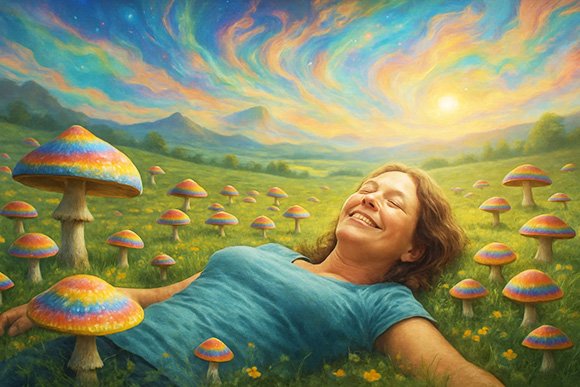by Dr.Harald Wiesendanger– Klartext
What the mainstream media is hiding
Good news for hundreds of millions of people worldwide who suffer from chronic depression: just a single dose of 25 milligrams of the active ingredient psilocybin is enough to significantly alleviate even severe symptoms for up to three weeks.

This is confirmed by a study published in the New England Journal of Medicine involving 79 adult participants.
It is confirmed by the German EPIsoDE study (Efficacy and Safety of Psilocybin in Treatment-Resistant Major Depression), which was completed in 2024: according to the study, one in three of 144 patients with treatment-resistant depression benefited significantly from a single dose of psilocybin in combination with psychotherapy. ‘We had some patients who had taken 20 different antidepressants without success, and we saw some amazing improvements,’ reports study leader Dr Gerhard Gründer, a psychiatrist at the Central Institute of Mental Health (CIMH) in Mannheim. ‘I believe that if we had the opportunity to treat patients with a second or third dose, we could really change the course of their illness and increase the number of those who respond to treatment.’
‘Magic mushrooms’ are small, inconspicuous lamellate fungi that contain psychoactive substances – primarily psilocybin and psilocin. These substances have a hallucinogenic effect, altering perception, thinking, and feelings. They are found worldwide, often growing in meadows, on the edges of forests, or on dung. The effects begin approximately 20 to 60 minutes after ingestion and last for 4 to 6 hours. Altered sensory perceptions such as more intense colours and patterns or acoustic distortions may occur, as well as euphoric states, an altered experience of time, a feeling of ‘connectedness’ with nature or other people, and spiritual and mystical experiences. However, nausea, anxiety, ‘bad trips’, and mental overload also occur occasionally, and psychosis can be triggered in particularly vulnerable individuals.
In July 2023, Australia became the first country in the world to approve psilocybin for the treatment of depression, followed by New Zealand in June 2025. Although psilocybin remains banned at the federal level in the United States, individual states – Oregon, Colorado, and New Mexico – have recently begun to allow regulated access. In Switzerland, since around 2014, the Federal Office of Public Health (FOPH) has regularly approved the use of psilocybin in exceptional cases to treat mental illnesses that are difficult to treat, e.g., therapy-resistant depression, anxiety in cancer patients, and post-traumatic stress disorder.
German ‘compassionate use’
And in Germany? In July 2025, two clinics – the CIMH in Mannheim and the OVID Clinic in Berlin – received permission to use psilocybin for treatment-resistant depression as part of a ‘compassionate use’ programme, following an individual risk-benefit assessment by the treating psychiatrists. ‘Compassionate use’ is a hardship provision: it provides controlled access to drugs that have not yet been approved when patients are seriously or life-threateningly ill and there are no longer any effective approved therapies.
As expected, Big Pharma lobbyists are putting the brakes on this. Natural substances such as psilocybin are difficult to patent. They could cannibalise the lucrative sales of traditional drugs. Drug manufacturers earn significantly more from long-term therapies with antidepressants, which must be taken daily, than from single or short-term therapies, as is common with psilocybin. Global sales of antidepressants currently stand at around 18 to 20 billion US dollars annually, are growing steadily, and, according to market forecasts, could double in the coming decade.
Dr. Harald Wiesendanger

